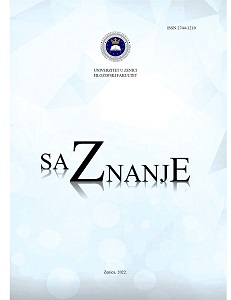ENGLISH PRESENT PARTICIPLES USED AS FREE ADJUNCTS AND THEIR MACEDONIAN EQUIVALENTS
ENGLISH PRESENT PARTICIPLES USED AS FREE ADJUNCTS AND THEIR MACEDONIAN EQUIVALENTS
Author(s): Katerina VidovaSubject(s): Morphology, Syntax, Eastern Slavic Languages, South Slavic Languages, Translation Studies
Published by: Filozofski fakultet, Univerzitet u Zenici
Keywords: present participle; free adjunct; translation; Macedonian; condenser;
Summary/Abstract: The aim of this paper is to investigate the use of English Present Participles as free adjuncts and their Macedonian translation equivalents. The research is focused on the use of the present participle as a free adjunct. The research was conducted using a selection of sentences excerpted from English and American literary works translated into Macedonian. Consequently, comparative methods were used to analyze the excerpted sentences. In Macedonian, verbal adverbs and clauses with verbal adverbs are the most commonly used as translation equivalents for the English present participles and participle clauses used as free adjuncts in sentences. However, clauses with verbal adjectives, clauses with verbs in Aorist, clauses with verbs in Imperfect, clauses with verbs in Present, nonrestrictive relative clauses, and temporal subordinate clauses were also identified as translation equivalents. Additionally, some similarities and differences between the English present participles used as free adjuncts and their Macedonian equivalents were discovered when examining the excerpted examples in English and Macedonian.
Journal: saZnanje
- Issue Year: 3/2022
- Issue No: 3
- Page Range: 318-327
- Page Count: 10
- Language: English

